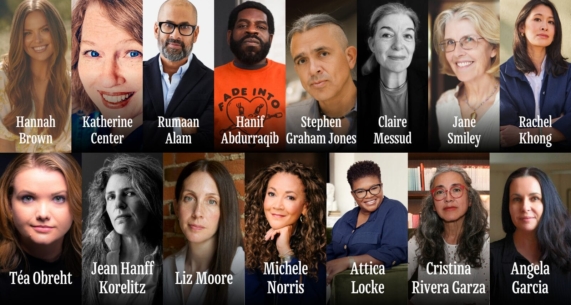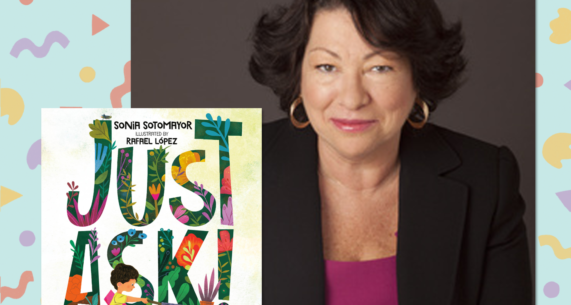Today we’d like to spotlight The Brown Bookshelf, a group of authors and illustrators dedicated to amplifying awareness of the myriad Black voices writing for young readers. Their flagship initiative, 28 Days Later, is a month-long showcase of the best in Picture Books, Middle Grade, and Young Adult novels written and illustrated by Black creators.
During each day of the twenty-eight days of Black History Month, The Brown Bookshelf profiles a different children’s or young adult author and children’s illustrator. Importantly, though, 28 Days Later emphasizes the necessity of celebrating Black authors, creatives, writers, and artists year-round. Their monthly Generations Book Club continues what 28 Days Later begins by featuring a themed list of books by Black creators for the youngest readers through adults and related links and resources.
We had the fortunate opportunity to speak with Brown Bookshelf Board member Paula Chase-Hyman, author of So Done and the Del Rio Bay series. Find the Q&A below!
———————————————–
Tell us about the origins of The Brown Bookshelf. What inspired you to be a part of the organization?
Back in the early 2000s, there was a writing forum called The Blue Board. I met many of the writers that I still consider friends there. It’s also where I met Varian Johnson, Kelly Starling Lyons, and Carla Sarratt. Varian had just come out with his first YA, My Life as a Rhombus, and my debut YA, So Not The Drama, was on its way. YA was exploding. It was a true renaissance as it gained mainstream popularity beyond teen readers. But Varian and I noticed that YA with and by Black people wasn’t getting the same level of attention. Not current or past works.
It’s been so long now that I don’t know which of us came up with the idea first. But we decided that an outlet was needed to amplify Black children’s literature, specifically those creatives that 1) weren’t the publisher’s pick, what we consider under-the-radar, and 2) those creatives that had blazed the trail for the rest of us. Unsurprisingly, nothing like it existed. We knew it would be a lot of logistics, so we each identified people to come in to help round out the concept. He asked Don Tate and I asked Kelly Starling Lyons and Carla Sarratt, who no longer works with the group but is still very much a book advocate as the Director of Libraries at the University of Mount Union.
For the first few years, Don created these wonderful posters with headshots of all 28 featured creatives. Our hope was that librarians would display it. Over time, we phased that out due to the amount of work both on Don’s part and the libraries – because to display it, in all its glory, would have really required a larger printout. Still, I’d like to think that Don’s posters are collector’s items that one day someone can feature as part of the movement to showcase the depth and breadth of excellence in the Black children’s literature community.
We’ve been fortunate to maintain a board of seven to nine creatives on The Brown Bookshelf since its inception in 2007. And this is no easy feat. Every one of us is an actively working author and/or illustrator. We do this work because we believe in it. We’re a family and team:
Crystal Allen
Tracey Baptiste
Tameka Fryer Brown
Gwendolyn Hooks
Olugbemisola Rhuday-Perkovich
Why is it important to amplify Black voices and storytellers, especially for young readers?
Representation matters. There is no reason to perpetuate dulling our voices. Make no mistake, Black voices/storytellers have been and continue to be out there. But they’re dulled again and again. It’s not true that our stories aren’t out there. It’s not true that our stories won’t resonate with readers. It’s certainly not true that our stories won’t sell – especially if they were actually given the same consistent lift as books by white creatives.
I’ve always been a history buff. And there was a time when I liked watching shows like CNN’s The ’70s, ’80s, etc… But whenever you look at shows that purport to show you a slice of life from an era, Black people, if shown at all, tend to be given a few seconds almost always for their contributions in sports or entertainment. If one were to look at those shows, the simple assumption is either we didn’t exist at all or we had no part in crafting the era beyond the one Black artist they’re highlighting. Obviously false on both accounts. When media and books lack multiple, well-rounded portrayals of the role Black people played in America’s culture and development, the narrative is that we weren’t playing any role. So then it becomes easier to keep parroting falsehoods and pushing single narratives of the Black experience.
Young readers represent hope. You’ll notice that rather than specialize in a single genre, many Black creatives have worked across the children’s lit sphere. It’s because we understand the importance of having Black readers see themselves from picture book through Young adult literature. It’s also a chance for non-Black readers to see, hear and touch Black experiences. The earlier a reader is exposed to those stories the greater the chance we have of stamping out single narratives and falsehoods.
What sparked 28 Days Later and how do you celebrate Black History beyond Black History Month?
28 Days Later came out of the same discussions as our creation of The Brown Bookshelf. They were simultaneous creations. When we decided we needed to amplify Black works, 28 Days Later became the how. I still remember Varian questioning using the title of a zombie movie for our initiative. It was a bold, if not odd move. But my rationale was that 28 days later educators, parents, and librarians would walk away loaded with a long list of books for the young readers in their lives and with increased knowledge of the creatives behind those books. Emphasis on knowledge of the creatives.
I’ve always had a personal mission to make sure Black children’s lit creatives get the chance to become as well known as Ezra Jack Keats, Beverly Cleary, or Judy Blume – those authors whose work is in front of generations of readers. If names like Carole Boston Weatherford, Floyd Cooper, Sherri L. Smith, Derrick Barnes, Pat Cummings, Coe Booth, or Denene Millner aren’t familiar to you, despite their many contributions, that’s a problem for me.
Building on amplification opportunities, we began the Generations Book Club, last June. The initiative was conceived by Kelly Starling Lyons as a way to highlight books by Black creatives, boost book sales, help families nurture literacy skills, and bridge the social distancing divide by offering a shared reading experience within families and groups. Throughout the summer, we highlighted a single picture book, middle grade, young adult, and adult books across specific themes like Music, Culture, Community, and Heritage. In September, we decided to go beyond summer, stopping only for the 28 Days window. Using themes to curate books for the entire family has been a great way to build on exposing just how much work is out there.
Do you have a favorite author/artist who has inspired you in your storytelling?
Mildred L. Taylor for sure. I’ve always been a fan, but it wasn’t until a few years ago that I realized how growing up reading her books about the Logan family impacted me as an author. Being exposed to books that told stories of pain and triumph with an honesty that empowered the reader, making it easy for me to write books that revolved around tough topics. Taylor’s work showcased a certain historical era, but the themes of her work are as relevant today when it comes to the duality of the dangers of one’s Blackness while celebrating the many joys of our culture.
What’s next for The Brown Bookshelf?
We find ourselves in an interesting place since Kwame Alexander asked us to host the 2020 Kid Lit 4 Black Lives rally. It was an incredible event to be part of and it increased our exposure greatly. The more viewers to our 28 Days Later spotlight, the better. However, it also lit a flame for broader advocacy for Black creatives. In August, we worked with Renee Watson and Cheryl and Wade Hudson on A Call To Action, essentially outlining elements of the publishing system we believe needs to be overhauled to better support Black creatives.
In March, we’ll be announcing new partnerships and initiatives that were borne directly of both the rally and our Call to Action. Mindful that there’s only so much bandwidth an individual has, we’re excited to be working with organizations like Highlights Foundation and We Need Diverse Books to build on our efforts to amplify and empower Black creatives in children’s literature. As long as there’s a place to find our voices, that’s one less excuse available for anyone pretending not to understand the importance of representation.
Be sure to follow The Brown Bookshelf on Facebook (@thebrownbookshelf), Instagram (@BrownBookshelfTeam), and Twitter (@brownbookshelf).



